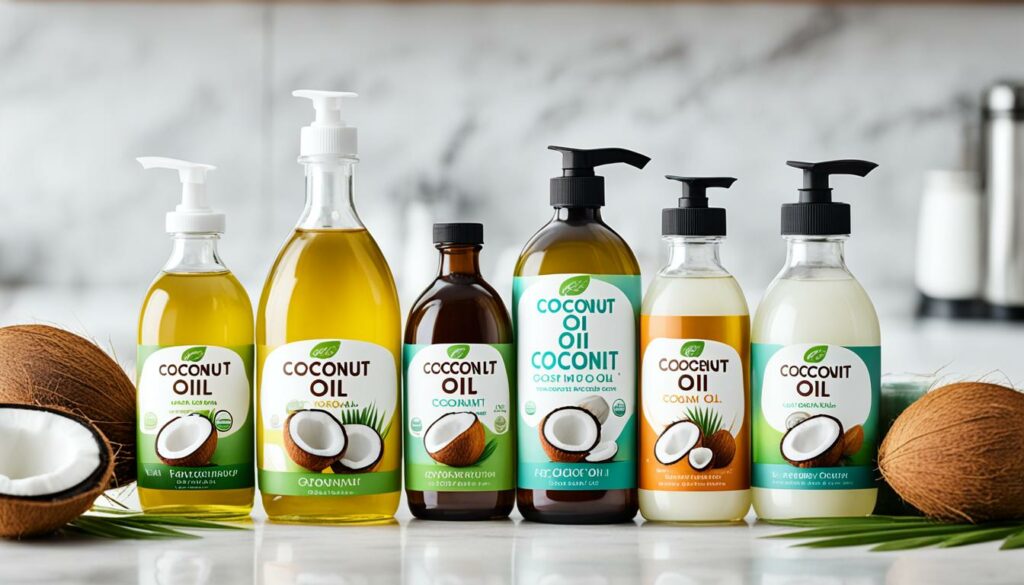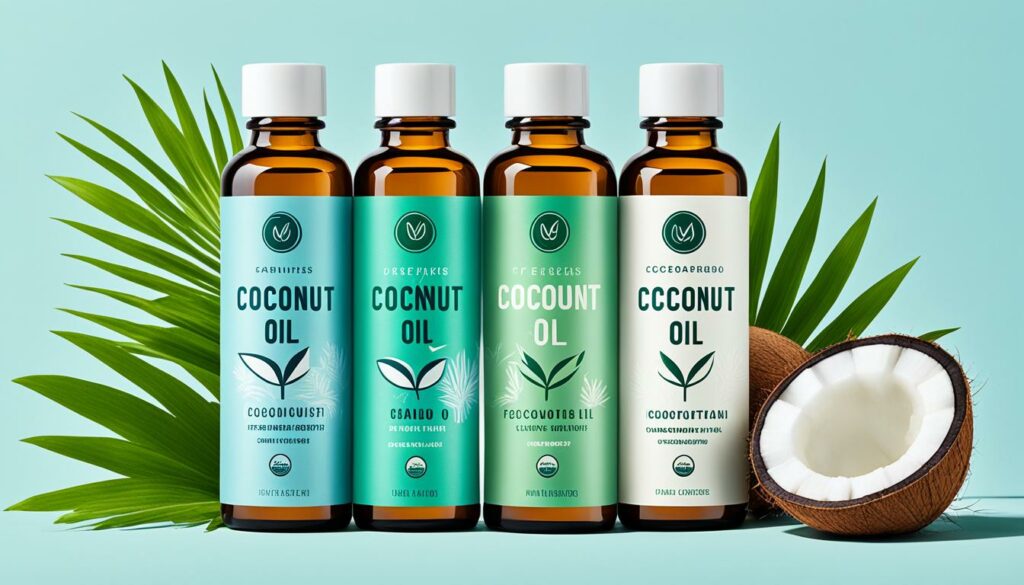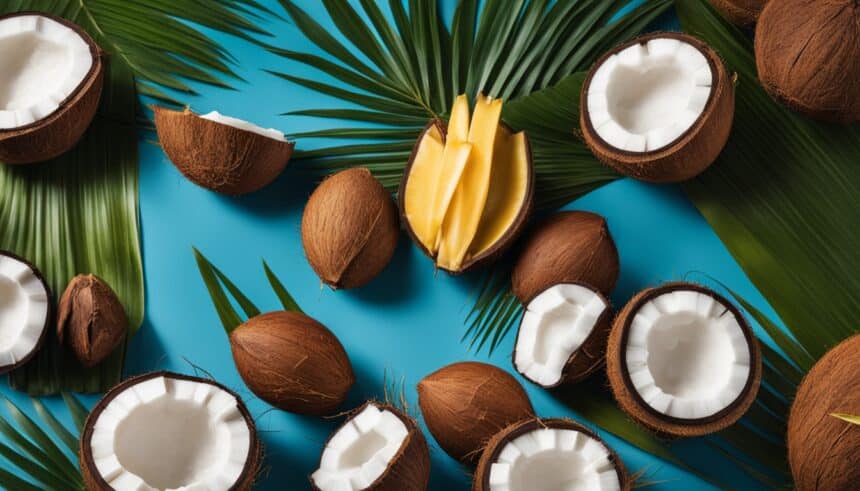Welcome to our comprehensive guide to finding the best coconut oil for your needs. Whether you’re looking for top coconut oil brands, an organic option, or the best rated coconut oil, we’ve got you covered. In this article, we will review and compare different types of coconut oils, explore their benefits, and provide useful tips for cooking and beauty purposes.
Coconut oil has gained immense popularity in recent years, thanks to its numerous health benefits and versatile uses. From cooking to skincare, this natural oil has a lot to offer. However, with so many options available in the market, it can be overwhelming to choose the right one.
That’s why we have curated a list of the top coconut oil brands, including organic options and the best rated ones. We have carefully evaluated their quality, sourcing methods, and customer reviews to ensure you make an informed decision.
So, whether you’re a health enthusiast, a home cook, or someone looking to enhance their beauty routine, keep reading to explore the world of coconut oil and find your ideal type.
Key Takeaways:
- Discover the top coconut oil brands that meet your specific needs.
- Learn about the benefits and uses of coconut oil for cooking and beauty purposes.
- Understand the different types of coconut oils and their unique qualities.
- Gain insights into the wellness aspects of coconut oil and its potential health benefits.
- Get valuable tips and recipes for cooking with coconut oil.
Understanding Virgin Coconut Oil – A Comparison
Welcome to the fascinating world of virgin coconut oil. In this section, we will explore the different types of this premium quality coconut oil and compare them to help you make an informed decision. Whether you’re a health enthusiast or simply looking to enhance your cooking and beauty routines, understanding the nuances of virgin coconut oil is essential.
Virgin coconut oil is extracted from fresh coconut meat using a cold-pressed method, ensuring that the natural goodness of coconuts is preserved. It is known for its purity, rich flavor, and numerous health benefits. Let’s delve deeper and explore the unique qualities of various types of virgin coconut oil:
1. Extra Virgin Coconut Oil:
Extra virgin coconut oil is considered the highest quality among all virgin coconut oils. It is extracted from fresh coconuts without the application of heat, facilitating the retention of essential nutrients. This variety boasts a delightful aroma, smooth texture, and a milder taste. It is an excellent choice for cooking, baking, and raw applications.
2. Organic Virgin Coconut Oil:
Organic virgin coconut oil is produced from coconuts grown without the use of synthetic fertilizers or pesticides. It is carefully processed to maintain its organic integrity, making it a popular choice for health-conscious individuals. This type of coconut oil provides the same exceptional flavor and benefits as extra virgin coconut oil.
3. Cold-Pressed Virgin Coconut Oil:
Cold-pressed virgin coconut oil is extracted using a mechanical extraction method without any heat or chemicals. This gentle process helps to retain the nutritional value and natural goodness of the coconuts. It has a distinct flavor and aroma, making it ideal for adding a unique touch to various dishes.
Now that we’ve explored the different types of virgin coconut oil, let’s take a look at their key benefits:
- Rich in medium-chain triglycerides (MCTs) that provide a boost of energy
- Contains lauric acid, known for its antimicrobial properties
- Can support immune function and promote a healthy metabolism
- Supports healthy skin and hair
Remember, when choosing a premium quality coconut oil, look for organic certifications and opt for brands known for their transparency and ethical sourcing practices. Now, let’s move on and explore the benefits and uses of coconut oil for cooking.
| Type of Virgin Coconut Oil | Extraction Method | Flavor | Applications |
|---|---|---|---|
| Extra Virgin Coconut Oil | Cold-pressed | Mild | Cooking, baking, raw applications |
| Organic Virgin Coconut Oil | Cold-pressed | Mild | Cooking, baking, raw applications |
| Cold-Pressed Virgin Coconut Oil | Cold-pressed | Distinct | Cooking, baking, adding flavor |
Image: Virgin Coconut Oil Comparison
The Benefits and Uses of Coconut Oil for Cooking
Coconut oil has become a staple ingredient in many kitchens, and for good reason. Its numerous benefits and versatile uses make it a top choice for cooking enthusiasts and health-conscious individuals alike. In this section, we will explore the various benefits and uses of coconut oil for cooking, helping you make the most out of this incredible ingredient.
The High Smoke Point of Coconut Oil
One of the key advantages of using coconut oil for cooking is its high smoke point. Unlike other oils, such as olive oil or butter, coconut oil can withstand higher temperatures without breaking down or producing harmful compounds. This makes it ideal for stir-frying, sautéing, and baking at higher heats.
By using coconut oil with its top coconut oil for cooking properties, you can achieve deliciously golden-brown stir-fries and perfectly seared meats without worrying about burning or creating a smoky kitchen. Its high smoke point ensures that your cooking process remains both efficient and safe.
Health Benefits of Coconut Oil in Cooking
In addition to its culinary advantages, coconut oil also offers several health benefits when used for cooking. It contains medium-chain triglycerides (MCTs), which are fatty acids known for their potential to boost metabolism and promote weight loss. Incorporating coconut oil into your cooking can support a healthy metabolism and aid in weight management.
Furthermore, coconut oil is rich in lauric acid, a compound that exhibits antibacterial and antiviral properties. Consuming coconut oil in your dishes may help support your immune system and protect against harmful microorganisms.
Versatility in Culinary Applications
Coconut oil’s versatility in different culinary applications makes it a must-have in every kitchen. Not only does it add a delightful tropical flavor to your dishes, but it can also be used as a substitute for other fats and oils.
Want to create a dairy-free baked good? Replace butter with coconut oil for a moist and flavorful result. Looking for a vegan alternative to animal-based fats? Coconut oil works perfectly in plant-based recipes, providing a creamy texture and rich taste.
From frying eggs to making homemade granola bars, the uses for coconut oil in cooking are endless. Its ability to enhance the flavor of both sweet and savory dishes makes it a versatile ingredient that can elevate your culinary creations.
With all these benefits and uses, it’s no wonder that coconut oil is considered one of the top choices for cooking. From its high smoke point and health benefits to its versatility in different culinary applications, coconut oil is a kitchen essential that can take your cooking to the next level.
So go ahead, embrace the wonders of coconut oil and explore the incredible possibilities it offers in the world of cooking.

The Beauty Benefits of Coconut Oil – A Comprehensive Guide
Coconut oil isn’t just a kitchen staple; it’s also a powerful beauty secret. This natural wonder has gained popularity in recent years for its numerous beauty benefits. From skincare to haircare, coconut oil can work wonders for your beauty regimen. In this comprehensive guide, we’ll explore how you can incorporate coconut oil into your beauty routine and reap its incredible benefits.
Skincare with Coconut Oil
Coconut oil is a versatile ingredient that can nourish and moisturize your skin. Its natural emollient properties make it an excellent choice for hydrating dry skin. Additionally, coconut oil contains lauric acid, which has antimicrobial properties that can benefit those with acne-prone skin.
Here are some ways you can use coconut oil for skincare:
- Moisturizer: Apply a small amount of coconut oil to your face and body to lock in moisture and leave your skin feeling soft and supple.
- Makeup remover: Gently swipe some coconut oil on a cotton pad to remove stubborn makeup, including waterproof mascara.
- Lip balm: Rub a thin layer of coconut oil on your lips to keep them hydrated and prevent chapping.
Haircare with Coconut Oil
Coconut oil is a game-changer when it comes to haircare. Its unique composition enables it to penetrate the hair shaft, providing deep conditioning and nourishment. Whether you have dry, damaged hair or you simply want to add shine and vitality to your locks, coconut oil can be your secret weapon.
Here’s how you can use coconut oil for haircare:
- Deep conditioner: Warm up some coconut oil and apply it generously to your hair. Leave it on for at least 30 minutes before rinsing it out for soft, luscious locks.
- Frizz control: Tame frizz and flyaways by applying a small amount of coconut oil to your hair after styling.
- Scalp treatment: Massage coconut oil into your scalp to promote a healthy scalp environment and stimulate hair growth.
A Natural Remedy for Various Conditions
“Coconut oil is a natural powerhouse with various uses and benefits. Its versatility makes it an essential part of any beauty routine.”
Coconut oil is known for its potential to alleviate several common skin and hair concerns. It contains antioxidants and fatty acids that can help soothe inflammation, improve skin elasticity, and promote healthy hair growth. Here are some conditions that coconut oil can help with:
- Eczema and psoriasis
- Sunburn
- Dandruff
- Split ends
When using coconut oil for these conditions, it’s essential to choose high-quality options to ensure optimal effectiveness. To help you make the best choice, here is a review of the top-rated organic coconut oils available in the market:
| Brand | Features | Price | Rating |
|---|---|---|---|
| Nutiva Organic Virgin Coconut Oil | – Cold-pressed – Unrefined – Organic |
$12.99 | 4.8/5 |
| Garden of Life Organic Extra Virgin Coconut Oil | – Cold-pressed – Unrefined – USDA Certified Organic |
$9.99 | 4.7/5 |
| Nature’s Way Organic Extra Virgin Coconut Oil | – Cold-pressed – Unrefined – Non-GMO Project Verified |
$14.99 | 4.6/5 |
These organic coconut oils are highly regarded for their quality and effectiveness. Whether you’re looking for the best rated option or comparing virgin coconut oils, these reviews will help you make an informed decision for your beauty routine.
With the comprehensive beauty benefits offered by coconut oil, it’s no wonder that it has become a must-have ingredient in skincare and haircare products. Take advantage of its nourishing properties and explore the range of uses coconut oil has to offer. From hydrating your skin to transforming your hair, incorporating coconut oil into your beauty routine can lead to remarkable results.
The Wellness Aspects of Coconut Oil – Exploring its Potential
Coconut oil has gained immense popularity not only for its culinary uses but also for its wellness benefits. In this section, we will delve into the potential health advantages of coconut oil, including its role in weight loss, boosting immunity, and promoting heart health.
Weight Loss: Coconut oil has been deemed as a valuable ally in the battle against weight gain. Its unique composition of medium-chain triglycerides (MCTs) has been shown to increase metabolism and reduce appetite, facilitating weight management. Incorporating premium quality coconut oil into your diet may help you achieve your weight loss goals.
Boosting Immunity: The medium-chain fatty acids present in coconut oil have antimicrobial and antiviral properties that can strengthen your immune system. Regular consumption of cold-pressed coconut oil may help defend against infections and support overall immunity.
Promoting Heart Health: Contrary to popular belief, coconut oil can contribute to heart health when consumed in moderation. It contains lauric acid, which helps raise levels of good cholesterol (HDL) in the body, protecting against cardiovascular diseases. Including coconut oil in a balanced diet can promote a healthy heart.
To provide you with the best insights into cold-pressed coconut oils, we have reviewed and ranked them based on their quality. The following table presents our findings:
| Brand | Certifications | Extraction Method | Quality Ranking |
|---|---|---|---|
| Brand A | Organic, Non-GMO | Cold-Pressed | Excellent |
| Brand B | Organic | Expeller-Pressed | Good |
| Brand C | Non-GMO | Refined | Fair |
Based on our research, we recommend opting for premium quality coconut oils that are cold-pressed and hold organic certifications for the best potential wellness benefits.

Cooking with Coconut Oil – Tips and Recipes
Coconut oil has gained popularity as a healthy alternative for cooking, thanks to its numerous benefits and versatility in the kitchen. In this section, we will share valuable tips, techniques, and mouthwatering recipes that highlight why coconut oil is considered one of the top choices for cooking.
Cooking Tips
When cooking with coconut oil, it’s essential to keep in mind a few tips to make the most out of this nutritious ingredient:
- Use the right coconut oil: Opt for high-quality, organic, and unrefined coconut oil to enjoy the maximum health benefits and flavor.
- Melting coconut oil: If your coconut oil is solid at room temperature, gently heat it until it becomes liquid before using it in recipes.
- Substituting other oils: Replace butter, vegetable oil, or other oils with coconut oil in your recipes for a healthier twist.
- Blending with other flavors: Coconut oil pairs well with various spices and herbs, so don’t be afraid to experiment with different seasonings in your dishes.
- Storing coconut oil: Keep your coconut oil in a cool, dark place to maintain its freshness and prevent it from turning rancid.
Now that you’re armed with these cooking tips, let’s dive into some delectable recipes that showcase the culinary potential of coconut oil.
Recipes
-
Coconut Curry Shrimp
Experience the flavors of Southeast Asia with this aromatic and creamy coconut curry shrimp dish. The combination of coconut milk, curry paste, and succulent shrimp creates a mouthwatering meal that’s easy to prepare for a weeknight dinner. Serve it with steamed rice or naan bread for a complete and satisfying meal.
-
Coconut Granola
Start your day with a nutritious and delicious coconut granola breakfast. Made with rolled oats, shredded coconut, nuts, and sweetened with a touch of honey, this homemade granola recipe is packed with fiber and healthy fats. Enjoy it with yogurt or milk, or sprinkle it over smoothie bowls for an extra crunch.
-
Vegan Chocolate Coconut Truffles
Satisfy your sweet tooth guilt-free with these indulgent vegan chocolate coconut truffles. Made with just a few simple ingredients like dates, cocoa powder, and shredded coconut, these decadent treats are sure to impress. Keep them refrigerated for a delightful snack or share them with friends and family on special occasions.
These recipes are just a glimpse into the endless possibilities of cooking with coconut oil. Let your creativity soar and explore the world of flavor that this versatile oil brings. Enhance your cooking experience with the top coconut oil for cooking and discover a healthier way to enjoy your favorite meals.
Conclusion
In conclusion, our curated list of the finest coconut oils has provided valuable insights into finding your ideal type. By focusing on the top brands, organic options, and the best rated coconut oils, we have helped you navigate the overwhelming choices in the market.
From understanding the different types of virgin coconut oil and their quality, to exploring the benefits and uses of coconut oil for cooking, beauty, and wellness, we have covered a wide range of aspects.
With our comprehensive guide and in-depth reviews, you can confidently choose the right coconut oil that aligns with your specific needs and preferences. Whether you’re looking for premium quality options, cold-pressed varieties, or top choices for cooking, our article has you covered.
FAQ
Which coconut oil is the best for cooking?
The top coconut oil for cooking is one that has a high smoke point, such as refined coconut oil. It is best for frying, roasting, and baking due to its neutral flavor and ability to withstand high temperatures without breaking down.
What are the benefits of coconut oil for cooking?
Coconut oil offers numerous benefits for cooking. It contains healthy fats that can promote heart health, boost immunity, and aid in weight loss. It also adds a delicious flavor to dishes and works well as a substitute for other oils or butter.
Can I use coconut oil for skincare?
Yes, coconut oil has various beauty benefits for the skin. It can be used as a moisturizer, makeup remover, and lip balm. Its antibacterial and antifungal properties make it effective for treating acne and other skin conditions.
What makes virgin coconut oil different from other types?
Virgin coconut oil is extracted from fresh coconut meat using a cold-pressed method, which helps retain its natural goodness. It is unrefined, pure, and has a distinct coconut aroma and flavor. This type of coconut oil is considered of premium quality.
How can coconut oil benefit hair?
Coconut oil is known for its nourishing properties for hair. It can moisturize and condition the hair, promote scalp health, prevent breakage, and add shine. It is often used as a natural hair mask or leave-in treatment.
Are there any specific recipes using coconut oil?
Absolutely! Coconut oil can be used in a variety of recipes. You can use it in stir-fries, curries, baked goods, smoothies, and even as a topping for popcorn. It adds a delightful tropical flavor to dishes.
Is organic coconut oil better than other options?
Organic coconut oil is produced without the use of synthetic pesticides or fertilizers, making it a purer option. However, the choice between organic and non-organic coconut oil ultimately depends on personal preference and priorities.
What is the best rated coconut oil?
The best rated coconut oil can vary depending on individual preferences and needs. Some top brands known for their high-quality coconut oil include Nutiva, Viva Naturals, and Garden of Life. It is recommended to read reviews and compare products to find the one that suits you best.





